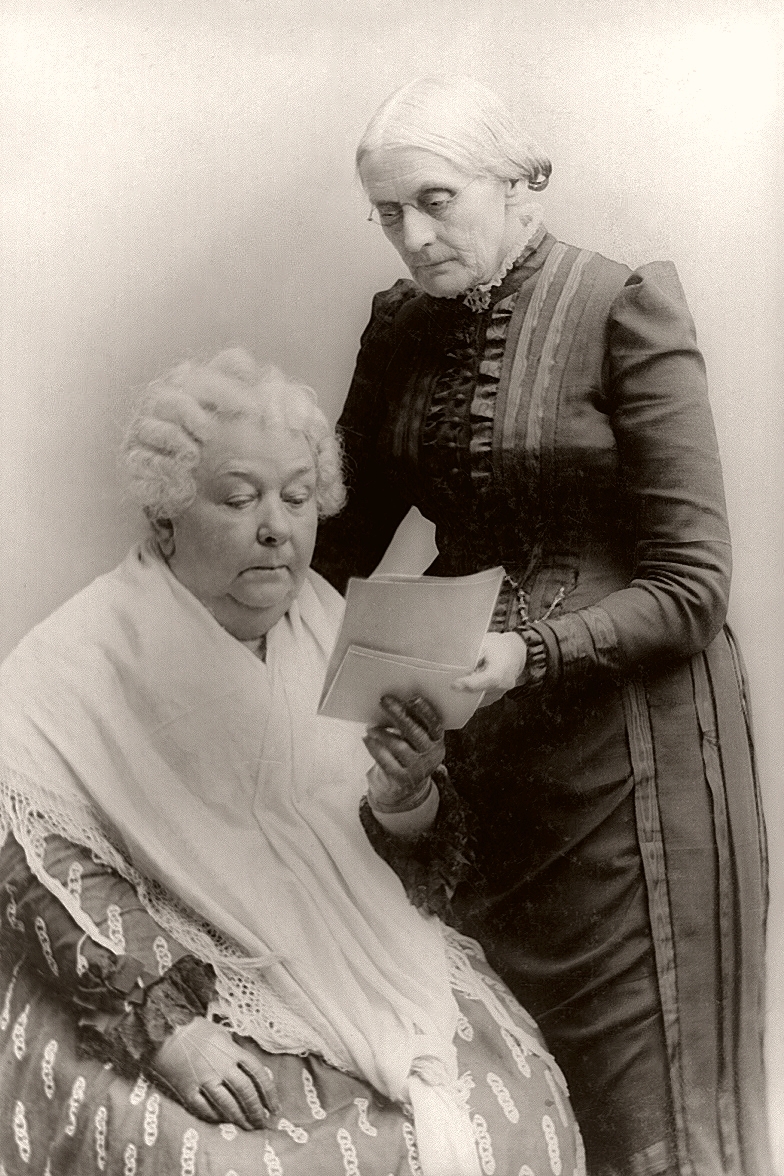Courage & Insanity, from Suffrage to Childbirth
Submitted by Hermine Hayes-Klein
 Today every American citizen will have the opportunity to vote in the federal election. The fact that this right extends to the female half of the American population is the product of the life-long efforts of a “small group of thoughtful and committed citizens” over several generations. The struggle that ended with the 19th Amendment to the U.S. Constitution granting women the right to vote holds lessons for any movement that aims to secure women’s rights, including the movement to secure woman-centered care for every woman in pregnancy and childbirth.
Today every American citizen will have the opportunity to vote in the federal election. The fact that this right extends to the female half of the American population is the product of the life-long efforts of a “small group of thoughtful and committed citizens” over several generations. The struggle that ended with the 19th Amendment to the U.S. Constitution granting women the right to vote holds lessons for any movement that aims to secure women’s rights, including the movement to secure woman-centered care for every woman in pregnancy and childbirth.
Over two days in the summer of 1848, around 300 people gathered for a human rights conference. The Seneca Falls Convention was a grass-roots women’s rights conference organized by a small group of feminist Quakers and a scholar of law, Elizabeth Cady Stanton. The organizers of the event articulated their concerns and demands in the brilliant Declaration of Sentiments. In the Declaration’s list of unacceptable sex inequalities, Stanton included the denial of the franchise, or the right to vote, to women. Even Lucretia Mott, a radical feminist and conference co-organizer, objected, “But Lizzie, thee will make us ridiculous!” Stanton would not budge, and the demand for the vote remained in. As Mott predicted, the clause regarding the franchise was the most controversial and divisive topic under discussion at the conference, and led to ridicule and condemnation in the press. Stanton was unconcerned, believing that, for a cause as radical and revolutionary as fundamental rights for women, there is no such thing as bad publicity.
 Stanton’s good friend Susan B. Anthony spent the majority of her life trudging door to door, in those long skirts of the 19th century, in all weather, asking women to sign petitions demanding the right to vote. Most of the time, she recounted later, she was turned away; the women could say, “I have all the rights I need,” and their husbands would add, “Yes, she has all the rights she needs. Now get off my property.”
Stanton’s good friend Susan B. Anthony spent the majority of her life trudging door to door, in those long skirts of the 19th century, in all weather, asking women to sign petitions demanding the right to vote. Most of the time, she recounted later, she was turned away; the women could say, “I have all the rights I need,” and their husbands would add, “Yes, she has all the rights she needs. Now get off my property.”
The right to vote was not secured before the deaths of either Stanton or Anthony, and the torch passed to another generation. Alice Paul, Lucy Burns and another small group of American women fought for the right to vote while Emmeline Pankhurst and a small group of British women fought for it in England. These women were not only ridiculed and vilified; they were jailed, beaten, and tortured. (The work of Paul and Burns is dramatized in the 2004 movie Iron Jawed Angels.)  When Alice Paul was in jail, she staged a hunger strike, at which point she was put in a straight jacket and fed raw eggs through a tube down her throat until she vomited blood. She was then transferred to a sanitorium, and a psychiatrist was brought in to examine her and confirm her prosecutors’ claim that she was insane and should be permanently institutionalized. The doctor who examined her reported that she was not only sane, but she was strong, and brave. He is quoted as having added, “Courage in women is often mistaken for insanity.” Paul’s courage led to a public outcry against the mistreatment of the “suffragettes,” which in turn contributed to the passage of the 19th Amendment (by one vote!). The long struggle for the female vote holds many lessons for the movement, now uniting around the world, to demand respect for women’s fundamental rights in childbirth.
When Alice Paul was in jail, she staged a hunger strike, at which point she was put in a straight jacket and fed raw eggs through a tube down her throat until she vomited blood. She was then transferred to a sanitorium, and a psychiatrist was brought in to examine her and confirm her prosecutors’ claim that she was insane and should be permanently institutionalized. The doctor who examined her reported that she was not only sane, but she was strong, and brave. He is quoted as having added, “Courage in women is often mistaken for insanity.” Paul’s courage led to a public outcry against the mistreatment of the “suffragettes,” which in turn contributed to the passage of the 19th Amendment (by one vote!). The long struggle for the female vote holds many lessons for the movement, now uniting around the world, to demand respect for women’s fundamental rights in childbirth.
Radical paradigm shifts take time, and require patience and persistence on the part of those who pursue them. The right to vote took several generations to secure. The work begun by Ina May Gaskin’s generation is being picked up and carried forward by my own.  Ina May’s generation reinvented American midwifery and rediscovered the basic physiology of childbirth. And still, 35 years after the publication of Spiritual Midwifery, the cesarean rate skyrockets, maternal mortality rises, and the right to give birth outside of the medical institution is not secure. And so we see the rise of a movement, women picketing across the U.S., marching in the streets of South America, going to court in Europe, and opening birth centers in India, the movement that organized 1000 screenings of Freedom for Birth on September 20th.
Ina May’s generation reinvented American midwifery and rediscovered the basic physiology of childbirth. And still, 35 years after the publication of Spiritual Midwifery, the cesarean rate skyrockets, maternal mortality rises, and the right to give birth outside of the medical institution is not secure. And so we see the rise of a movement, women picketing across the U.S., marching in the streets of South America, going to court in Europe, and opening birth centers in India, the movement that organized 1000 screenings of Freedom for Birth on September 20th.
The struggle for suffrage, and the struggles for each and every right that women have secured over the last 150 years, show us that you don’t wait for popular opinion to demand your rights. Otherwise you could wait for another 5000 years. Every time a new set of rights has been secured for women, from the right to vote, through the right to higher education, to the right to work without sexual harassment, the majority of women declared themselves unconcerned with the right at stake and unwilling to agitate for it. Once a small group of committed radicals secured each right on behalf of all women, the tides of public opinion could turn. How many women today would say that women shouldn’t have the right to vote or go to college? But if you were one of the women fighting for these rights when women didn’t have them, your opinions would have been unpopular. You would have had to go to some kind of meeting to connect with the other women who thought the issue mattered at all. The right to vote, like women’s other rights, was secured by the tiny minority ready to step forward and claim that right on behalf of all women.
But who are these few, the women who step up and demand the rights that their society, and its history, deny that they deserve? They are the Stantons, the Anthonys, the Pauls, the Burnses, and all the women whose names we don’t know, but whose work has secured the liberty that American women enjoy today. They have been strong, and brave.
“Courage in women is often mistaken for insanity.” How much courage does it take for a woman to acknowledge that birth matters, and to step off the traveled path and seek out the care that she, personally, needs for childbirth? How much courage does it take a woman to do so without the support of friends, family, and even partner? It takes courage to speak up when somebody is talking down to you, to request information about your choices when somebody can’t seem to imagine that you would do anything but obey. It takes courage to say, “No.” Especially when you’re in labor.
Almost a century after Alice Paul was strait-jacketed, courage in women is still mistaken for insanity. When women demand recognition for their rights of authority and autonomy in childbirth, they meet two common reactions: they are accused of caring more for themselves than their babies, and they are accused of insanity. I think of Karen in the Netherlands, who found the courage to deliver her twin daughters at home, when her local hospital refused to support her in a physiological birth. “I knew, somehow, that my body could birth the twins if it had a chance,” she told me. “They wouldn’t give it a chance at the hospital. They wanted a dozen people in the room, and machines stuck to my belly and my vagina, and they itched to cut the babies out. I live three minutes from the hospital, so I decided to give myself a chance to birth them at home, with a midwife.” Her babies were born in less than two hours, with no pain, into her own hands and her husbands’. When authorities discovered what had happened later that day, Karen and the twins were bullied into coming into the hospital for examination. Although Karen and her babies were healthy, she was indeed examined: for 5 days, she was visited at her hospital bed by psychiatrists and child protective services. She spent months fending off the threat that her twins could be taken away.
I think of Daniela in Italy, who sought far and wide during pregnancy for a provider who wouldn’t cut an episiotomy. She was promised that the hospital where she would deliver would respect her insistence that an episiotomy not be cut. She told every single provider that she spoke with, during pregnancy and then during her labor at the hospital, that under no circumstances did she want an episiotomy. She told this more than once to the doctor who ended up between her legs while her baby came out. When the baby was crowning, that doctor reached for scissors and started cutting an episiotomy. Daniela screamed “No!” from the depths of her soul. The doctor looked up, hesitated, and then cut a long, deep episiotomy.
When medical staff visited her bed after the birth, Daniela was deeply upset. She felt profoundly violated and traumatized. She spoke up, loudly, about what had happened and stated that her legal and human rights had been violated. The obstetricians called the psychiatrists, who came to suggest that, in her state, she might pose a danger to her newborn child. After she left the hospital, Daniela was visited twice at her home by psychiatrists, without an invitation. On top of the trauma of the episiotomy was added this violation of her safe space, her home, and the need to then convince these psychiatrists that they need not involve child protective services and take away her new baby.
And there is, of course, the case of V.M. in New Jersey. V.M. found the courage to read the forms she was given to sign when she arrived to give birth in a hospital with a 50% cesarean rate. She was asked to sign advance authorization for anything that might be done to her body once she entered the institution. She read the list of interventions that she was asked to accept on arrival, and signed that she would let them run an IV line into her vein and strap her belly to an electronic fetal monitor; she consented to oxygen, an epidural, and – yes- she gave advance consent to an episiotomy. She did not sign away her consent for cesarean section and to have a screw inserted up her vagina and into her baby’s scalp. Hospital staff surrounded her, in labor, to ask why she wouldn’t sign the form and whether she cared about her unborn baby. They “explained the potentially dire circumstances” that can occur in a birth, and an ob-gyn came to discuss “brain damage, mental retardation, and fetal death.” (These quotes all come from the court opinion linked above.) Bear in mind that there was no medical emergency occurring in the labor; the staff simply wouldn’t accept that V.M. might not pre-authorize anything they might choose to do to her and her baby. When V.M. refused to complete the form, she was described as “irrational” and “combative” in her file, and the hospital sent in psychiatrists. One of them interviewed her for an hour, while her labor progressed. “While Dr. Kurani was there, the anesthesiologist was able to administer an epidural.” The second psychiatrist interviewed her while the baby was actually being born. “Before Dr. Jacoby’s evaluation was completed, V.M. gave birth vaginally to J.M.G. without incident.” The psychiatrists reported that, although she seemed sane and reasonable, she had admitted to having experienced a trauma years before, seen a psychiatrist, and taken anti-depressants, which she stopped taking when she became pregnant. They claimed that this past, combined with her “irrational” behavior around the consent form, raised a question of her parental competence. Her baby was taken away after the birth. Four years later, she still hadn’t received the child back. I don’t know if she ever did.
It took courage for Karen to trust her own relationship with her body over the medical system’s concept of it, and to choose circumstances for the birth of her twins that would allow her body to do its work. It took courage for Daniela to stand up against the butcher who slashed her perineum, to say “No! You may not cut a woman against her will!” It took courage for V.M. to exercise her right to consent to surgery only if that surgery was actually necessary, to stand up, while in labor, for this fundamental right in the face of a dehumanized bureaucracy of doctors, nurses, and psychiatrists.
If the worst that could happen to Alice Paul was institutionalization, the worst that can happen to a birthing woman is to have her baby taken away. That is what happened to V.M. That was the threat underlying the accusations of insanity thrown at Karen and Daniela. Just as we remember the courage of those whose actions so radically transformed the legal status of women over the last two centuries, we should recognize the courage that we see around us in the women who stand up for their bodies and their babies in a broken birth care system. And we must defend these women, and their babies, from the psychiatrists and social workers unleashed upon them for finding that courage.
Two months after Alice Paul’s hunger strike, President Woodrow Wilson urged the U.S. Senate to pass a constitutional amendment granting women the right to vote. He called on the Senate to do “this thing that is mere justice,” in the name of America’s success in the world war. “The tasks of the women lie at the very heart of the war, and I know how much stronger that heart will beat if you do this just thing and show our women that you trust them as much as you in fact and of necessity depend upon them.”
Almost 95 years later, the women who Stanton and Paul worked so hard to empower have turned our attention to the task of childbirth. And we ask no more than Wilson asked the Senate, for mere justice: that those who wish to ensure a safe and healthy birth for every baby recognize that the person with the authority and responsibility to choose what is needed for each birth is the birthing woman herself. How true for motherhood are the words that Wilson used for war: “show our women that you trust them as much as you in fact and of necessity depend upon them.”
Hermine Hayes-Klein was the organizer of the Human Rights in Childbirth Conference in the Hague on May 31-June 1st of this year.








